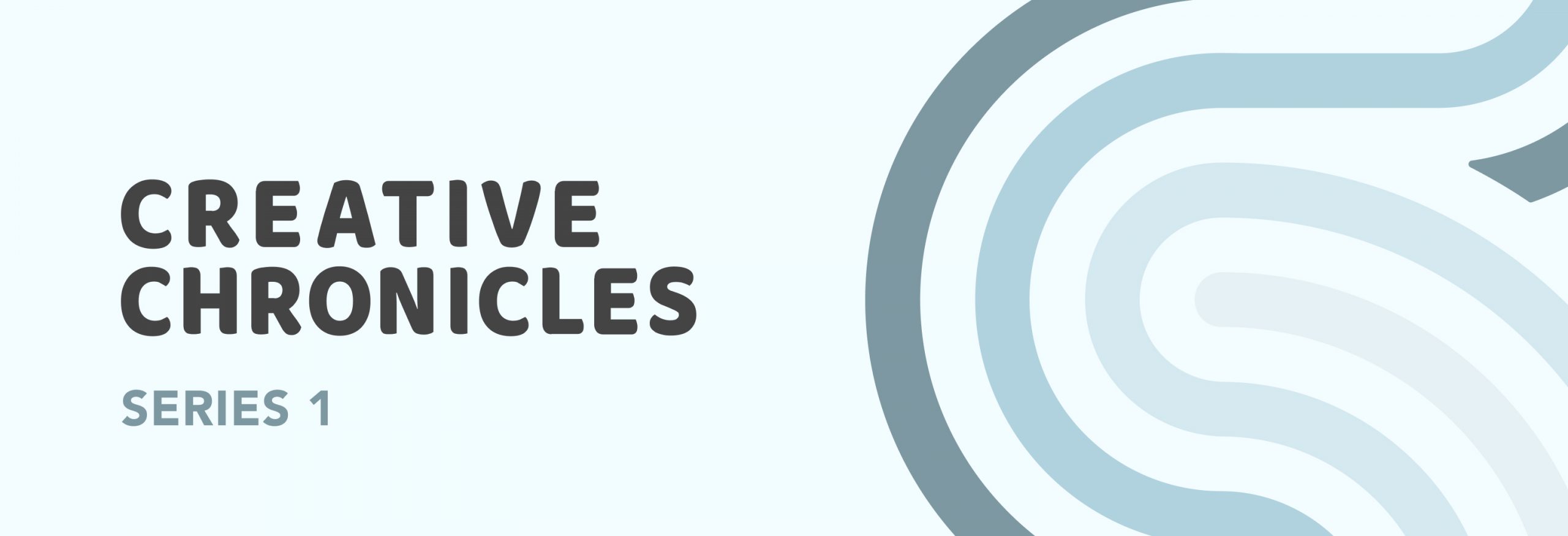Life of a Senior Designer: Designing Value, Valuing Design

Creative Chronicles is a series of articles exploring the lives of four Singaporean Creatives. In Series 1, they share about where they are in their creative journey today by choosing a selection of images in response to the prompt, “Because of me, the world…“. The images were then used as conversation starters during our chat with the Creatives.
In this article, we chat with Fariz, Senior User Experience Designer at Chemistry. Trained in Communications Design, he leads multidisciplinary teams through all phases of the digital UX design process. Driven by his belief in human-centred work, Fariz is also an educator. He is an Adjunct lecturer for Experiential Design at Nanyang Polytechnic and was a Visiting Instructor at General Assembly.
Fariz shares with us how he finds it important to consistently engage in meaningful work. In being part of human-centred work that brings value to others, he feels valued. Thus, Fariz strives to evoke empathy in his works, but he has learned that empathy doesn’t come easy. For him, practicing empathy has been a continuous journey of listening, observing and learning from others.
We present his chosen images and a curation of themes that emerged from our chat. Instead of presenting the conversation chronologically, we delve into each theme through verbatim quotes from various parts of our chat with Fariz. We hope you find the patterns that have emerged as insightful as we have.
All ideas are good, they only fit well or poorly in different contexts.
Studio Dojo: What has been a pivotal lesson learned in your journey as a designer?
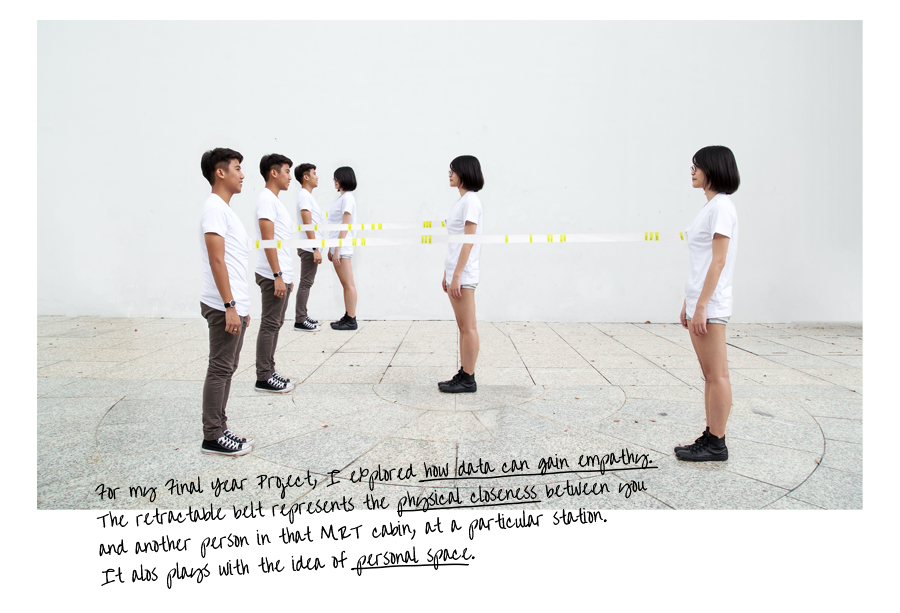
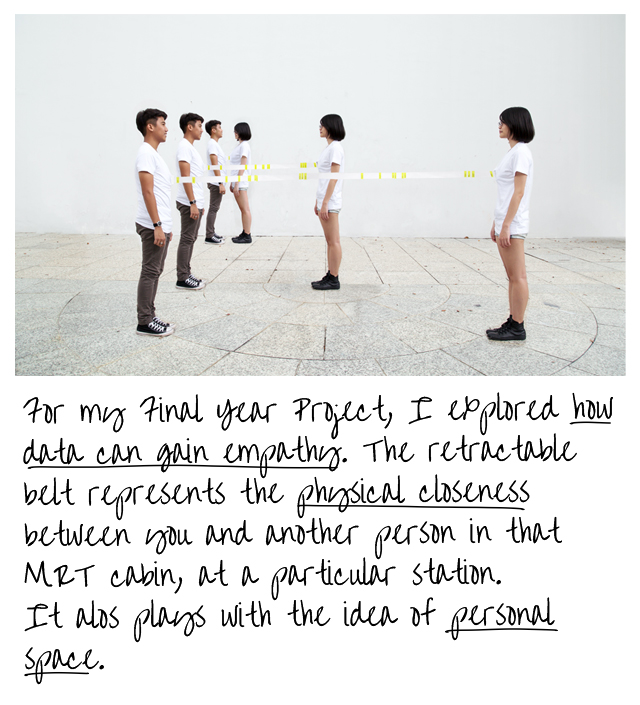
Back in polytechnic, I saw myself as an Information designer, and that sort of helped me to understand how to make Information design a lot more accessible to people though empathy. I thought of different ways of communicating it for my Final Year Project, ‘Data without Numbers’. I asked myself – what would be the best way to collect data? I boarded the MRT and started counting the number of people in each cabin at every station, and represented the data visually. This project was the tipping point of me entering into a more human-centred approach to design but in a very abstract and process-driven methodology.
My project was a critical journal paper and I was selected to present it at a conference. I remember when I presented, there was this one guy who was very objective and mentioned it is very Art and he didn’t see value in it. But if you think about it in today’s context, if you turn this into a sensor to track the proximity of people in terms of distance, it’s very relevant now considering the COVID-19 situation and social distancing.
It made me realise that this artwork or experimental process might not be relevant to some people at certain junctures, but with the right luck and opportunity, it might be very valuable. That’s where I realized that as an educator and as a designer, it’s always good to remember that sometimes not all ideas are bad. It’s just a matter of finding that right moment to polish and spruce it up.
To me, this realisation came full circle because of an earlier conversation I had with a lecturer and the assurance I got from her that my idea was valuable. I always refer back to that poignant moment. I was doing a branding project that incorporated elements of Service Design but I was having a hard time doing it, or rather I didn’t have faith. When I was approaching my lecturer for consultation, there was a point where I wanted to give up.
I returned back to the classroom and 10 minutes later, she came back with printed materials from a website. She told me, “Hey, you can actually do this and you just need to do this and that”. For me, that was pivotal because she saw value in some of my ideas. Sounds very corny but that led me to think that not all ideas are bad. And that it’s okay to get into the unknown at first, everything is a learning process.
Sometimes, at the right place at the right time, your idea might work.
Empathy, it’s complex but necessary.
Studio Dojo: And in the right context where your ideas work, what would an ideal outcome be?
I think in general, empathy is important. You are able to see people the way they are. I believe that people always have preconceived judgement about things due to their culture, education and the way they grew up, to what they’ve been taught in school.
And empathy is that bridge to see from another perspective, and to understand that person’s experiences. By doing so, it will make the place a lot better because there’s so much prejudice out there. If only you’re able to understand where they come from, why they do certain things and what led to their decision-making process. Although empathy is the easiest emotion to get people to know one another very well, it’s not so simple.
For example, recently I’ve created an infographic to visualize the recent Lebanon bomb blast and how it might look if it were to happen in Singapore. I think my training as an Information designer has always been leading my content on LinkedIn. I wanted to bring across the website and charities that Singaporean can support.
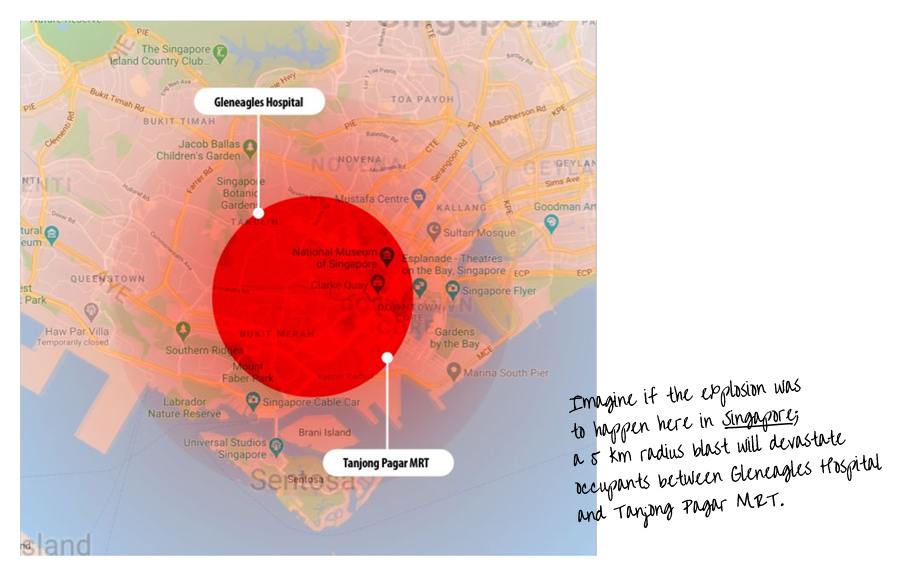
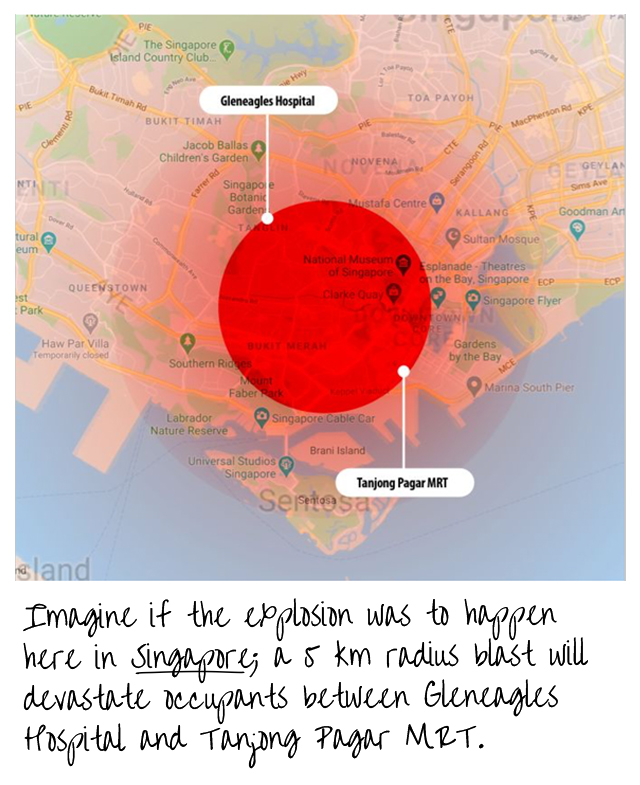
How do you bring empathy and help people understand the gravity of such situation? How does it feel to have such capacity to empathise and hopefully act on it either through sharing or another?
As an information designer, it makes things a lot easier to bring forth certain information that is not being conveyed properly in mainstream media or pop culture. I want to continue producing content that is thought-provoking like this Lebanon piece.
To live a meaningful life is to do valuable work.
Studio Dojo: You’ve mentioned the concept of ‘value’ a couple of times in our conversation. Why is value important to you and the work that you do?
There are projects that I feel that I have no value in them. I feel very frustrated because there’s no meaning to it. For me, it’s about meaning and I want to feel useful. I do not want to waste time doing things that I have no value in. It will be very purposeless work.
So, that’s why I’ve been doing design work that has a lot of value. For example, Information Design, you’re turning complex information into something digestible for people to read. User Experience design, you’re making meaningful and seamless experiences for people. Service Design, you’re improving business processes to make things efficient for businesses and users. When there’s value for people, it makes me feel that I’m valued. I was a part of that process.
I want people to acknowledge me for certain things. It was very severe back then but now, my work speaks for itself. I do not need to be proactively getting or seeking for validation. I know for a fact that my work is good and I do not need people to consciously tell me about it.
This is something that I had to learn to be humble about – to take things slowly and not make a big deal of it.
And I’m very grateful and privileged to be where I am now. To have a job in this current situation and to be living in a very stable family condition. I’ve always learned to ground myself by being reflective and by doing so, I don’t think I am currently yearning for something more. If anything, I would want to learn. Whether on the job or pursuing my studies. Making things better by value-adding with the new knowledge and relevant information, which can bring my work to that next level.
Influencing others to adopt healthy practices.
Studio Dojo: What is the next thing you’re excited to learn about?
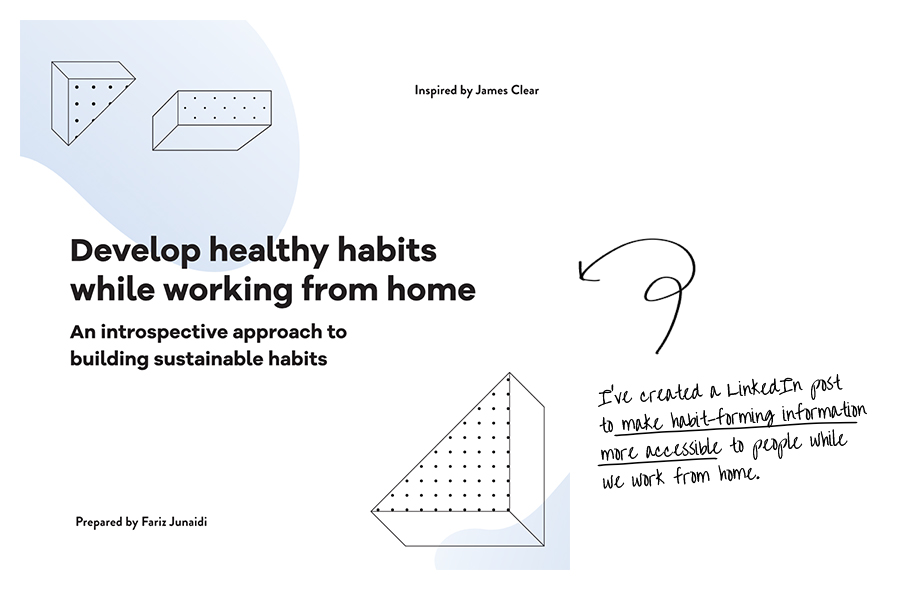
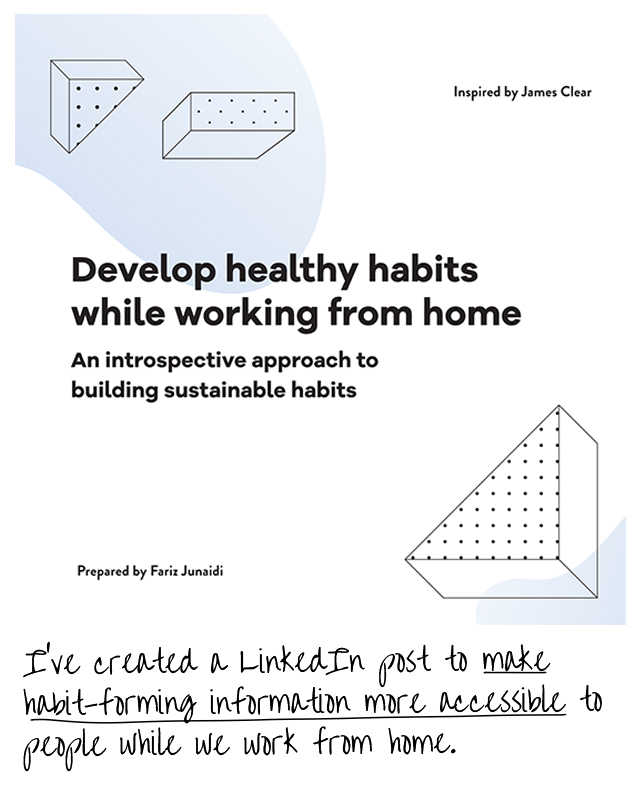
I’ve been very interested in Behavioral Science and using behavioral nudges to get people to do certain right things. I’ve been learning the EAST framework which is to make things easy, attractive, social and timely.
In trying to get into that space, I’ve created mindfulness or habit-forming LinkedIn posts to make habit-forming information a lot more accessible to people. It’s an interesting way of forming habit by coming up with very small, everyday attainable habits. Hopefully with that small initiative, it helps me to learn Behavioural Science and behavioural nudges.
I think there’s this age old saying that if you love what you do, you don’t have to work. For me, being in this space, I’m quite easily contented and have the passion to learn more about it, to get better and to do things well. But at the moment, it’s very hard for me to learn Behavioral Science. There’s Coursera but in my line of work, it’s very specific which means I would need to read a lot of white papers on it. To be honest, I like studying and learning but I do not have the time currently at my work.
To value others and be valued by others.
Studio Dojo: You’re currently a Senior Designer at Chemistry. What is the life of a Senior Designer like?
Proposals. The kind of work that brings in the dough from proposal writing, presenting to clients, managing and scoping the projects, and doing costing. It’s a very administrative, business development role, which is great. It means that they’ve entrusted me with such responsibilities which not many people at my level are able to do. I’m very grateful for that.
I do see the value but at times, I miss doing on-the-ground work such as talking to people, and conducting co-creation workshops which my colleagues are doing. Sometimes, I feel left out. However, they need to do the work to gain the experience, like how I did over the past years. Working in a small consultancy, you need to be agile. You definitely need to handle both business and on the ground work, which I like. Being a small company has that autonomy to switch roles and wear different hats at different junctures.
But it’s a very weird dynamic now when you’re the senior designer leading and guiding people. Remember when you first started working, having this clique of colleagues and never having lunch with the boss? It’s happening. Your colleagues, interns or whoever do not invite you. Fearing that you pry over their gossips. It’s inevitable so that’s why I’ve always try to make it clear that work is work, and personal things are personal.
It’s a very hard delineation and a lot of people can’t do that. I’m still learning to navigate a channel of open communication which they can feel safe to critique and give feedback about their unhappiness on the way I work or delegate certain things. They are still having lunch with me, I have a UI designer under me and we are very close.
It’s that perception of hierarchy that makes it difficult for others to approach you, top-down or bottom-up. One of my approaches to that is to address my junior designers as colleagues and equals to clients. It helps make their roles important and have them feel and seen as part of the family. You’re not just an intern or junior designer. You’re part of that workforce that make things happen, regardless of status or hierarchy. I make that conscious effort to make them feel valued. I will always acknowledge their work by saying thank you and putting their names in the emails.
It’s like a mirror. I want to be valued and for them to feel valued as well.
Staying authentic to my personal values is a journey in itself.
Studio Dojo: Share with us a poignant moment in your journey as a designer thus far.
At this moment, I can’t think of a very poignant moment in my career apart from the fact that I’m now in Chemistry. I’ve applied for this job four times.
Once after polytechnic, second time after army, third after university and the fourth time was the charm. I was thinking there was no harm trying after three times. To me, that was one of the more defining moments in my career that I managed to get into a consultancy that I believe in.
It was a learning process for me to come up with a portfolio that is very relevant for them especially coming from an Art school. The education I had after university in General Assembly helps me to position myself to think very critically and be very familiar with the tools which I can share during the interview. So I was sad but I know why I didn’t get in. It was a learning process for me to get to where I want to be.
I’m a Leo and my personality has always been very strong. That tenacity has been there throughout my life and it has transcended into my personal life and school. It’s just knowing when to control it in certain social situations. For work, I have always been a go-getter, even in school. I’ve always wanted to be in that first class honours and be the best. That tenacity of wanting to do very well is part of my personality. Do or die, go big or go home.
But I’ve started to realize that some of these things and life itself is temporary, and knowing what to prioritize is important.
When you see yourself and your parents getting older or when you get into a very serious relationship, you sort of put things into perspective. You start to realize that things need to change. For me, so long as that goal is very healthy and it doesn’t hurt anyone in the process, I think that’s a very good goal and it what I’ve always been striving for.
I think some goals are not mentally healthy for some people. For example, trying to be the lead designer by next year and putting that pressure on yourself, and on your colleagues, which can affect the work. For me, that is not healthy.
I’ve been slowing down for sure but I do have aspirations. I’m quite contented with the work that I’m doing as it has always been something that I’ve been wanting to do. There will be a point in my time whereby I would want to push myself, to do something bigger, something more different and to see things in a different way. I don’t think I’ve reached that level yet. Maybe that’s when the tenacity will kick in.
My bigger goal is to leave a legacy of thoughts. In order to do so, I need to do small things. For example, doing smaller projects and doing it very well. I need to build a very strong client relationship. I need to learn how to project manage and I need to learn certain skills. In that sense, my tenacity is there to achieve these very achievable small goals.
Catch up on Fariz’s articles

